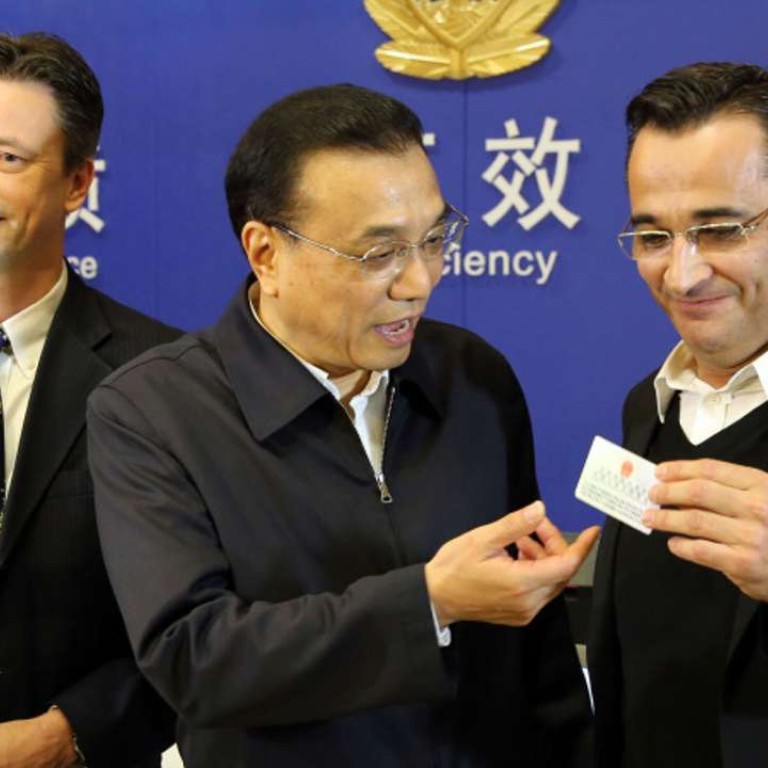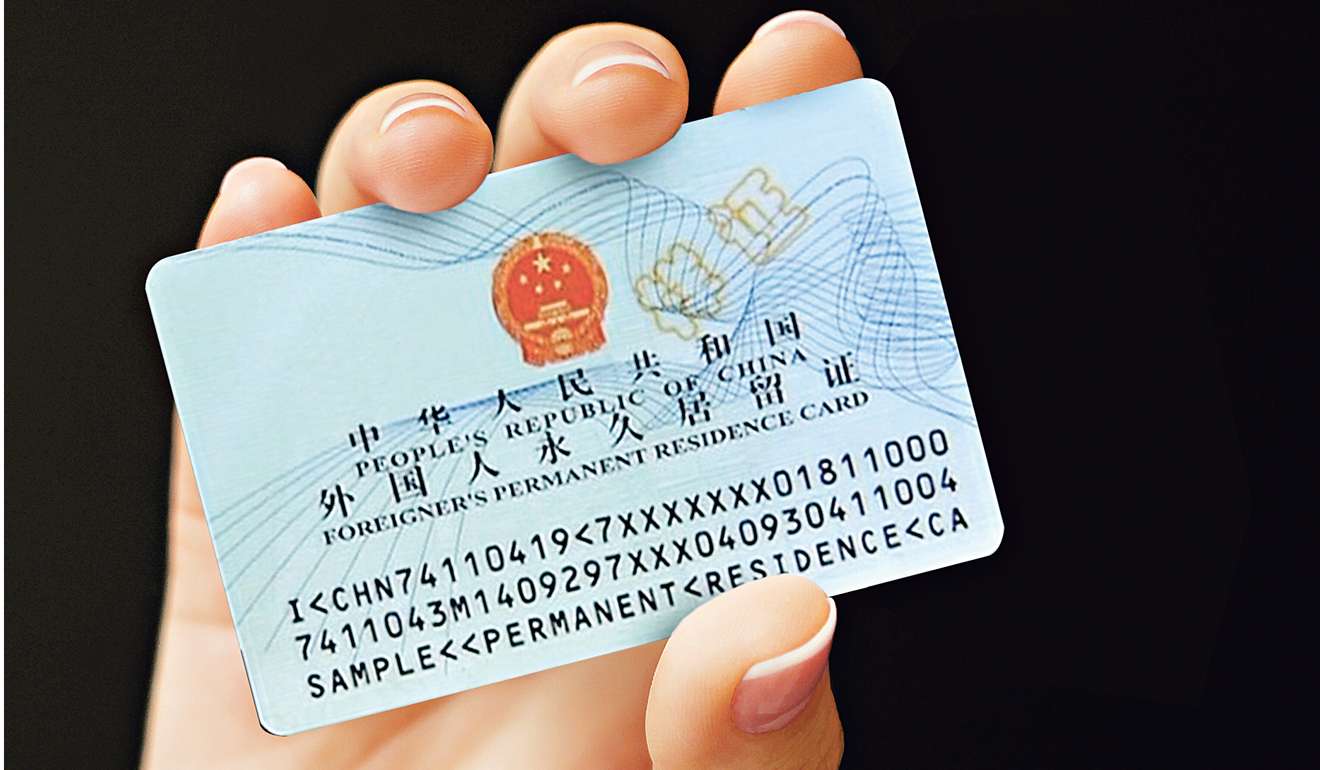
While Trump curbs immigration, China’s giving out more green cards … but can it attract more foreigners?
Mainland’s permanent residency card is not as useful in daily life as advertised
As US President Donald Trump attempts to curb immigration, China is trying to boost the issuance of green cards to foreigners – although from a base just 0.05 per cent of America’s.
According to the latest figures published by the US Department of Homeland Security, there were 13.1 million green card holders in the United States at the start of 2013, almost two-thirds of whom had acquired permanent residency in the previous 13 years. By way of contrast, in the first 10 years of mainland China’s green card scheme, starting in 2004, only 7,356 foreigners were granted permanent residency even though an estimated 600,000 foreigners live there.
Although the Chinese authorities said a year ago they were easing the rules to make it easier for foreigners from a broader range of professions to apply for permanent residency, experts say the threshold remains high and that Chinese green cards offer only limited practical benefits.
President Xi Jinping told a meeting in Beijing on February 6 that China should reform its permanent residency regime. The same day the Ministry of Public Security reported that 1,576 foreigners had become permanent residents of mainland China last year, 163 per cent more than in 2015.
The next day, People’s Daily reported that a new version of the Chinese green card, with enhanced security features, would be released later this year.
A State Council directive in February last year relaxed China’s green card rules, extending eligibility for permanent residency to foreigners working in a greater range of fields, including those working at national laboratories, engineering research centres, the technology centres of state-accredited hi-tech companies and foreign-funded research and development centres. Until last year, only foreigners who worked in government departments or laboratories involved in “key national projects” could apply for permanent residency in mainland China.
But applicants still have to jump through several hoops. In Guangdong, a green card applicant must have four years of work experience in the province – with an annual, before-tax salary of 400,000 yuan (US$58,000) or annual personal tax payments of at least 70,000 yuan to the local authorities – or have invested more than US$2 million in mainland China, or be at least an associate professor or associate fellow with a top research institution.
According to the central government, green card holders receive the same rights as Chinese citizens in areas such as investment, housing purchases and schooling, and the cards can be also used as a form of identification when buying a train ticket or booking a hotel room. The cards need to be renewed every 10 years but there’s usually no need to submit additional documentation.
However, those holding mainland China green cards say they do not grant them the same rights as Chinese citizens and are currently of limited use.

“I think the green card is still very much an honorary [thing],” said Gilbert Van Kerckhove, the owner of Beijing Global Strategy Consulting, who has worked with Beijing’s municipal government on urban infrastructure projects, including some for the 2008 Olympics. He received his green card in 2008 and had it renewed at a public ceremony staged for promotional purposes in 2012.
He said the main benefit of a Chinese green card was that the holder could stay in China for a long time without having to renew their visa every year.
Kerckhove said the green card was not recognised by most people in China and that made many of its supposed functions unusable. Green card holders also struggled to use their green cards in the same way Chinese used their identity cards because the number of digits on the cards were different.
“In principle, a cardholder should be able to get on a train or a plane or check in to a hotel with their green card alone,” he said. “But because most people, especially in smaller cities, had never seen a green card, they would still ask me for my passport. So theoretically, a green card issues the same rights as a local Chinese. But in practice, there are still problems. For example, if I wanted to open a bank account, they would still have to ask for my passport.
“Another problem is a green card does not have enough digits. So a green card is not equivalent to a Chinese ID card ... for example, you can’t book plane tickets with a green card. You can’t use the automatic machine to buy a train ticket.”
Homeric de Sarthe, from the Paris office of headhunting and human resources consultancy Dragonfly Group, said he knew three people with Chinese green cards – two French and one Belgian.
“They all have made a significant contribution to China … their business and life is in China now, their kids are in China, their wives are Chinese, for them, it’s logical to apply for a green card,” he said. “Basically, to my understanding, a China green card is a differentiation and a way to recognise foreigners who have been contributing to the country’s development and who have made China their home.
“The reason why they [Beijing] set the bar so high, is because they are not looking to have a foreign expert, like an American, become Chinese. Because when you get an American green card, the point is, in the long run, to become an American. But for the Chinese green card, it’s to prove that you are someone who values and respects the country and who won’t disagree it, then you deserve to have it.”
Tracy Ruan, from Shenzhen Shengtian Business Consulting, which specialises in foreigners’ employment and residence permit applications, said the green card scheme was not designed for those working in private, hi-tech start-ups.
“In Shenzhen, only a few foreign experts with vice-president or director titles working with government-backed tech giants like Huawei and ZTE have applied for green cards successfully,” she said. “None of the private tech companies do.
“I think the reform of the Chinese green card is aimed at building up the country’s image of openness and attracting world-class technical and scientific talent. Only those state-supported star enterprises and universities can hire these foreigners. It’s not much help for private companies and start-ups seeking to attract foreign talent.”

Kerckhove welcomed Xi’s call for reform of the system but added: “I don’t expect they will make green cards much easier to get. I think they are still going to be sitting on top of it.”
He said he remained sceptical about the government’s plan to expand the green card scheme because he felt the country was becoming less hospitable to foreigners.
“Many Chinese people, especially in Beijing ... now more than ever want to kick foreigners out. And, the number of expats in Beijing has dwindled,” he said. “I feel like the country is becoming less welcoming towards foreigners. They have become much more restricted ... when the government says they are opening up the country, they are actually closing it much more, especially in Beijing. In Beijing, getting a work visa is getting much more difficult for foreigners.”
The current green card scheme was so insufficient and mired in bureaucracy that it does not give people with talent and affection for China sufficient incentive to stay, Kerckhove added.
Wang Huiyao, director of the Centre for China and Globalisation, a Beijing-based think tank, called for foreigners to be more patient and confident about reform of the green card scheme. “It is very effective, especially in Beijing,” he said.
He said the country would continue to reform the scheme to attract more foreign talent and the minimum requirement for a green card would be lowered in the near future. Currently, those of Chinese descent with a doctorate and extensive work experience in China are eligible for a green card. “It is likely that the minimum [academic] requirement will be lowered to a master’s degree,” Wang said.
But Kerckhove said he advised most foreigners to forget about the scheme.
“Generally, when foreigners ask me the question [about applying for a green card], I will say forget it,” he said. “Unless you are a special person backed by the local government, forget it.”
He said the only exceptions were people willing to invest a lot of money in China, to the degree where the government had to acknowledge them. However, the great majorityof green card holders were former Chinese who had adopted a new nationality. He said official figures he had seen a few years ago, when the number of green card holders was about 8,000, showed that less than 1,000 were non-Chinese.


